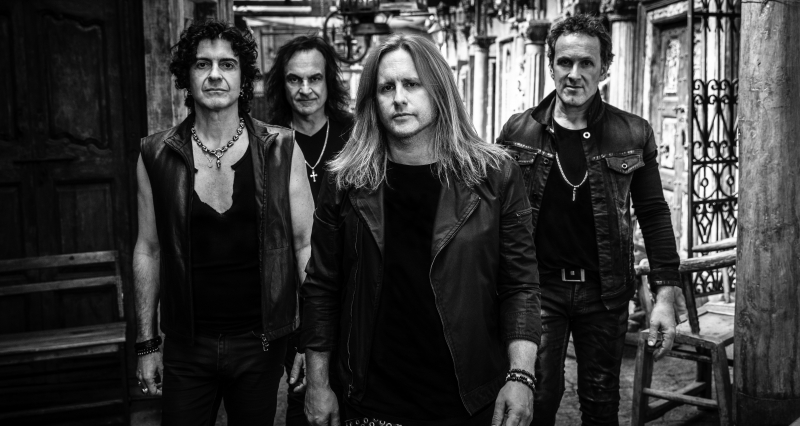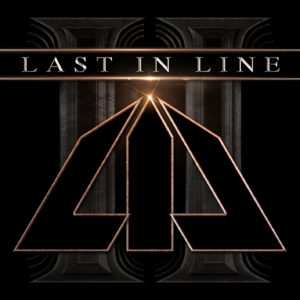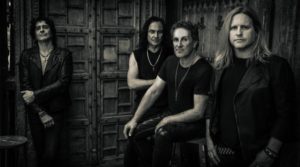
Last in Line began its life when the three original members of Ronnie James Dio’s original solo band got together just to jam for fun in the summer of 2012, with no expectation of anything substantial coming out of it. Eventually guitarist Vivian Campbell, drummer Vinny Appice and bassist Jimmy Bain realized the old magic was still there, even though it had been 27 years since they were in a room together and decided to continue on and see where things lead.
But they needed someone to sing the Dio songs from the first three albums and called upon veteran rock vocalist Andrew Freeman (former Lynch Mob, Hurricane, The Offspring and Raiding the Rock Vault member) to join in the still rather informal jam session. It was a propitious move that eventually led to some well-received tour dates and a record deal from Frontiers Music out of Italy. Since they were the original Dio band, they decided to call themselves after one the albums they played and wrote songs for, Dio’s second album (and most commercially successful), Last in Line.
“The first time I came in I just did three songs, was in and out, shook Viv’s hand on the way out and was out the door. Then I got a call a little later in the week saying they were thinking about doing some shows, and I said I was in. And it’s been a natural progression since then, and the band has just carried on from that point on. It just keeps evolving to the next thing and the next thing and the next thing. So, it’s really tough to say where it’s going to go next, but we’re all along for the ride,” said the band’s now permanent vocalist, Freeman.
The band’s debut album, Heavy Crown, released in 2016 was a smash success, garnering solid sales numbers alongside great critical and fan acclaim and led to a lots of tour dates and demand for more, all of which was an unexpected bonus for all concerned, including Freeman.
“I don’t know if I was expecting to do a second record. I mean, we weren’t expected to do a first record. And at the time I definitely wasn’t sure how Heavy Crown was going to be received. I certainly wasn’t expecting for things to have gone down the way they did. So, it was a nice surprise for sure for what was basically a side project. It’s nice to be able to pick this up at any time and go out and do it and have people interested,” Freeman said.
“Was it a surprise that it did what it did? Yeah, I think it was a surprise – everybody was surprised. I think we just thought it would be something where we would do the record and then everybody would just go back to their lives. The difference was that obviously this was something that had existed before between those three, but with a new guy. And I should have seen that it could have turned out to be something because of how serious Vivian took it. He’s so busy with one of the biggest touring acts on the planet, Def Leppard, it’s hard to imagine that we would put as much time and as much effort into what we do as we do. A lot of it has to do with the fact that he really likes this band, and he really enjoys performing with this band for fun. And his ‘for fun’ has turned into a business in a sense, and a viable brand.”
The band’s second album, Last in Line II will be released on Feb. 22, also through Frontiers, and features new bassist Phil Soussan (Ozzy Osbourne, Billy Idol) who replaced Bain in 2016 after he died suddenly on Def Leppard’s Hysteria on the High Seas Cruise.
 The album sees the band continuing down a similar sonic path as on Heavy Crown, with crunching riffs, stunning musicianship, memorable melodies and soaring vocals on powerhouse tracks such as Black Out the Sun, Landslide, and Gods and Tyrants.
The album sees the band continuing down a similar sonic path as on Heavy Crown, with crunching riffs, stunning musicianship, memorable melodies and soaring vocals on powerhouse tracks such as Black Out the Sun, Landslide, and Gods and Tyrants.
Although produced primarily by Jeff Pilson (Dokken, Dio, Foreigner), as was Heavy Crown, Freeman stepped up to take more responsibility for crafting and recording the melodies, vocals and lyrics, pointing to an evolution of the band as a creative entity.
“I think it’s inevitable that we evolve and change because we really don’t go in with a plan. We don’t say, ‘we’re going to write this kind of song, or that type of song,’ or try to sound like this or that. It’s a very short process in terms of getting the music done, because these guys are pros and know each other so well. You could probably count on your hands the number of times the band got together and jammed music. It’s very efficient; I think we had 13 or 14 ideas for this record and 11 of them made the final cut,” he said.
“Overall this record did take more time, and that’s because personally I wanted to take a little more time in getting things right as opposed to just going in and banging it out in three hours and be done with it and give it away to somebody else to make it into what they think it was supposed to be. For myself, I wanted to be way more involved than I was on the last record. You have to be more assertive when you really care about the final product. You could easily half ass it in this situation and there were elements of that on this new record that I thought were getting half-assed and I didn’t want that to happen, so I took action.”
That took the form of Freeman taking over control of those aspects of the production of Last in Line II to a greater degree when it came to melodies and especially lyrics for Last in Line songs. Freeman is fierce in his refusal to try and conform to what fans, critics or media would expect from a band that was created, in a sense, to continue a musical legacy that began under the auspices of Ronnie James Dio. Like all his bandmates, including the dearly departed Jimmy Bain, Freeman insists that Last in Line is not a tribute to Dio, it is a project that is reuniting the original band that Dio built, which composed and played the material from the band’s first three albums.
“It’s been a little bit of a challenge because of some of the misconceptions of what we are as a band. But I have to say, at no time in the process of either album was I like, well what would Ronnie do? Honestly, I don’t care what Ronnie would have done, and I am not trying to be disrespectful in any way to his memory of what he did with the band. But I personally can’t live my life like that. When I get comments of direction back to me from someone who says, ‘oh so and so would have loved that,’ or ‘so and so would have done that,’ I immediately change it,” he said.
“Actually, there was an email one time that said, ‘oh yeah, Ronnie would have loved that line.’ Cool, I am going to change that line because now that comment is in my head. It’s in my head so now it seems like I ripped this off or I tried to do something contrived, and I don’t ever want to do anything contrived. I want everything to be fresh and new. I am always striving to do things better and to take this band to the next level: not so much to the next level business wise, but to the next level musically, where it’s a natural evolution.”
In this regard there is tacit agreement from the other musicians in the band because they essentially leave Freeman to his own devices and trust that he will deliver melodies and lyrics that suit the musical foundation that Campbell, Appice and Soussan build.
“I don’t really think anybody really cares about the lyrics in this band, honestly. It’s very much a musicians’ thing here. It’s not like there’s a big pat on the back or people are sending flowers to my house because they love my words. I am very much trusted to turn these songs into what I feel they should be, with not a lot of resistance. I will get suggestions sometimes on things and if the suggestion is good, I will use it. But if I can’t get a grasp around it, I will try to improve on that suggestion,” he said, giving some insight into his process.
 “I love working titles of songs because they don’t usually come from me and it makes me approach a song in a unique way. I am usually like, ‘oh I like that title and wouldn’t have thought of that title.’ It came from someone else in the band and it was a working title for the songs, and I would take it and see if I could work it in somehow. And that seemed to work well. Listen, our whole creative process works really well, and it’s pretty much painless for everybody.”
“I love working titles of songs because they don’t usually come from me and it makes me approach a song in a unique way. I am usually like, ‘oh I like that title and wouldn’t have thought of that title.’ It came from someone else in the band and it was a working title for the songs, and I would take it and see if I could work it in somehow. And that seemed to work well. Listen, our whole creative process works really well, and it’s pretty much painless for everybody.”
In live situations, now that there is a second album to draw on, the set list will contain more Last in Line material, as well as a healthy dose of songs from the first Dio albums.
“We do the Dio hits, and at this point we’ve kind of changed it up to where we’re doing six or seven of our own songs in the set, but the classics are still there like We Rock and Rainbow in the Dark. But to be clear, this is not really a tribute. We don’t do anything live that these guys didn’t have a hand in writing. So, every song that we do, somebody on stage had a hand in creating it. There’s no Black Sabbath covers no Rainbow covers, or any of that stuff,” Freeman asserted.
“And luckily, Vinnie and Vivian and Jimmy were writers on all of that material from the first three albums. Although honestly, we only do stuff off the first two records [Holy Diver and Last in Line] because those guys didn’t like Sacred Heart. They weren’t big fans of it, so we don’t do anything off that record any more.
“So now we’re evolving into something else and we’re lucky enough to be evolving into something where people are not taking trips to the bathroom when we’re playing one of our own songs. I scan the room a lot from my vantage point on stage and often our new stuff doesn’t get the same response as Rainbow in the Dark, but people are still out there enjoying it and listening and singing along, which is a good sign that this new stuff is getting its own following.”
Besides Last in Line, Freeman is also working with a group called Lies, Deceit and Treachery, which encompasses members of the original BulletBoys, minus vocalist Marq Torien, who is touring under the BulletBoys banner with another group of musicians. Although they have a name and are composing songs, the quartet of Freeman, Jimmy D’Anda, Mick Sweda and Lonnie Vencent have no record deal at the moment.
“We’re doing the Monsters of Rock Cruise [embarking Feb. 24] but the problem with this band is they need to have a record out there to establish the new name. But it is in the works. Although there’s no deal on the table right now. There have been offers, but there’s just not enough music to put a record together yet,” he explained.
“It’s a very similar chemistry to what we have in Last in Line with Lies, Deceit and Treachery, in that there is just this amazing connection. We have three guys that haven’t seen each other since the summer, and we are doing the cruise and we’re not really rehearsing. We’re just going to in and bang it out, because that’s how it works. They are that good, and the chemistry is that solid and works so well. So, for me it’s like, ‘okay how do I fit in there?’ It would be really cool to have a band like that. You strive your whole life as a musician to find that sort of chemistry and these guys already have it – they just don’t have a singer. So, I am working hard to make that project work as well.”
In the interim, Last in Line are going to perform as often as they can, schedules permitting, including possible dates in Canada.
At present there are a smattering of dates in the U.S. in late March, with another run in late April and early May before heading overseas to the Download Festival in the U.K. on June 14.
For more information, visit www.lastinlineofficial.com.
- Jim Barber is a veteran award-winning journalist and author based in Napanee, ON, who has been writing about music and musicians for a quarter of a century. Besides his journalistic endeavours, he now works as a communications and marketing specialist. Contact him at jimbarberwritingservices@gmail.com.
SHARE THIS POST:
